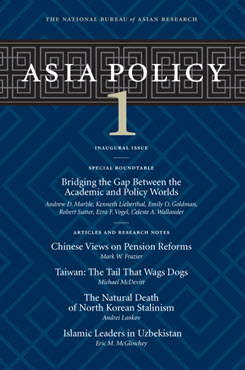Taiwan
The Tail That Wags Dogs
This essay explores how Taiwan has been able to seize the political initiative from China, Japan, and the United States.
EXECUTIVE SUMMARY
MAIN ARGUMENT
Taiwan has attained this leverage due to the interrelationship of four factors:
- Strategic considerations stemming from Taiwan’s geographic position lead Tokyo and Washington to prefer the status quo, while leading China to strive for reunification. China’s increasing military power, however, may suggest a Chinese intention to change the status quo.
- Shared democratic values and the fact that the “democracy issue” has greatly prolonged the timetable for reunification give Taipei political influence in both Washington and Tokyo.
- China’s constant threats of force actually empower Taipei in its relationship with Washington, and cause the United States to plan for the worst.
- Taiwan is a litmus test of U.S. credibility as an ally, a condition that in turn creates a perception on the island that U.S. military backing is unconditional.
POLICY IMPLICATIONS
- Taipei’s high-risk diplomatic approach carries with it the very real possibility of miscalculation, which could easily lead to great power conflict.
- The United States would benefit from exploring with Beijing ways in which to demilitarize the issue of Taiwan independence so that the threat of great power conflict over Taiwan is greatly moderated.
- Tensions may eventually lessen substantially if Beijing can be encouraged to substitute political deterrence for military deterrence.
- In order to ensure that the U.S. position in the region would survive a Taipei-provoked conflict should the United States choose not to become directly involved, Washington can undertake extensive talks with Japan designed to ensure that Japan does not lose confidence in Washington.
About Asia Policy
Asia Policy is a peer-reviewed scholarly journal presenting policy-relevant academic research on the Asia-Pacific that draws clear and concise conclusions useful to today’s policymakers. Asia Policy is published quarterly in January, April, July, and October and accepts submissions on a rolling basis. Learn more


